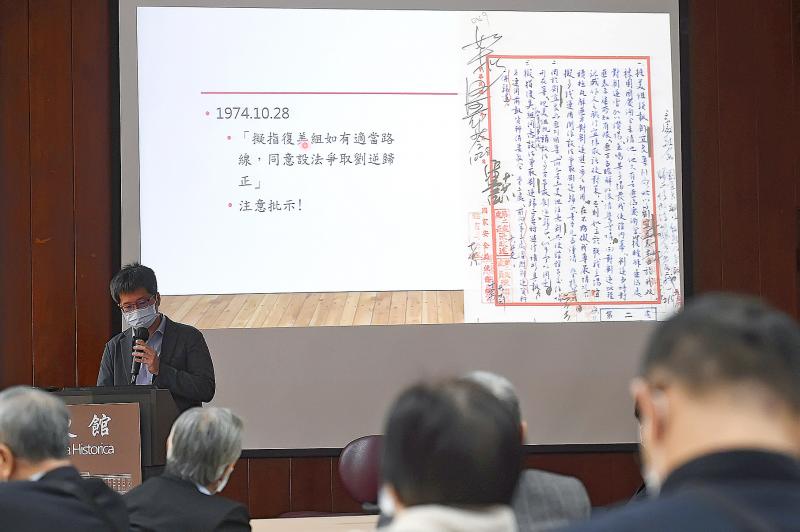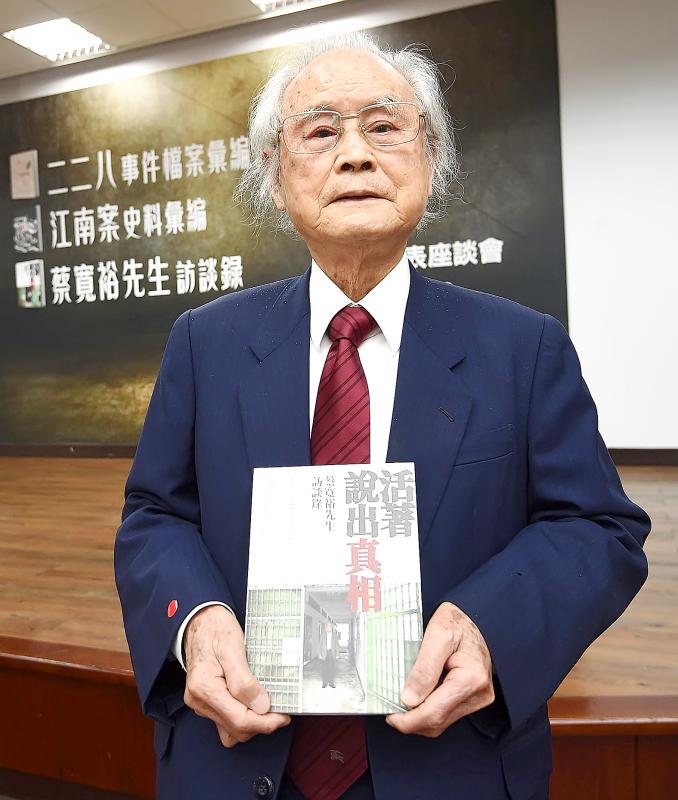The Academia Historica on Saturday published documents and eyewitness accounts of the Chinese Nationalist Party (KMT) regime’s human rights abuses during the Martial Law era.
Academia Historica President Chen Yi-shen (陳儀深) told a news conference in Taipei that the published books and papers represented more than 20 years of research and field studies by himself and other researchers.
“Although there are still aspects which require more study, we have made a lot of progress over the decades to document state violence and atrocities against citizens from that period,” he said.

Photo: Chen Chih-chu, Taipei Times
Among the works released was the three-volume Documentary Collection on Political Incident: The Henry Liu Case on the Oct. 15, 1984, killing of China-born US writer Henry Liu (劉宜良), who used the pen name Chiang Nan (江南).
Commissioned by the Academia Historica and the Taiwan Human Rights Museum, the volumes contain archival materials, interview transcripts and government papers on the death of Liu, who was shot at his home in Daly City, California, said Wu Chun-ying (吳俊瑩), one of its authors.
Liu, a vocal critic of the KMT regime, was best known for writing an unauthorized biography of Chiang Ching-kuo (蔣經國), who was later to take over the regime from his father, then-president Chiang Kai-shek (蔣介石).

Photo: Chen Chih-chu, Taipei Times
Wu said the documents and records from Taiwan and the US corroborated findings that the KMT regime knew about the planned murder of Liu, which was authorized by the Military Intelligence Bureau.
Then-vice admiral Wang Hsi-ling (汪希苓), head of the bureau, instructed Chen Chi-li (陳啟禮) of the Bamboo Union to murder Liu, which he did with two other members of the gang, Wu said.
An FBI and US Department of Justice investigation found evidence that implicated the Military Intelligence Bureau and the Bamboo Union in the murder, and they sent a team headed by Mark Richard, then deputy assistant attorney general for the criminal division of the department, to Taiwan to interview people connected with the case, Wu said.
The declassified documents showed that one communique from the department to the KMT government expressed grave concerns about Taiwanese authorities’ handling of the case, Wu said, adding that the documents also suggest that the government’s top leadership might have known about and authorized the murder.
Another book revealed at the news conference was on White Terror victim Tsai Kuan-yu (蔡寬裕).
After graduating from university in the 1950s, Tsai became a target of the KMT regime, and was arrested and charged twice, spending a total of 13 years in prison.
He was also involved in the Taiyuan Prison Insurrection on Feb. 8, 1970, when he and other political prisoners at Taitung County’s Taiyuan Prison attempted to escape to begin an armed insurrection against the KMT regime.
Tsai, now is in his late 80s, said he was asked by Tsan Tien-tseng (詹天增), one of the leaders of the insurrection who was executed soon after the incident, to survive the ordeal and tell the world what had happened.
“It is my duty to do so, for my compatriot in the prison who had sacrificed his life,” Tsai said.

Chinese Nationalist Party (KMT) Chairman Eric Chu (朱立倫), spokeswoman Yang Chih-yu (楊智伃) and Legislator Hsieh Lung-chieh (謝龍介) would be summoned by police for questioning for leading an illegal assembly on Thursday evening last week, Minister of the Interior Liu Shyh-fang (劉世芳) said today. The three KMT officials led an assembly outside the Taipei City Prosecutors’ Office, a restricted area where public assembly is not allowed, protesting the questioning of several KMT staff and searches of KMT headquarters and offices in a recall petition forgery case. Chu, Yang and Hsieh are all suspected of contravening the Assembly and Parade Act (集會遊行法) by holding

PRAISE: Japanese visitor Takashi Kubota said the Taiwanese temple architecture images showcased in the AI Art Gallery were the most impressive displays he saw Taiwan does not have an official pavilion at the World Expo in Osaka, Japan, because of its diplomatic predicament, but the government-backed Tech World pavilion is drawing interest with its unique recreations of works by Taiwanese artists. The pavilion features an artificial intelligence (AI)-based art gallery showcasing works of famous Taiwanese artists from the Japanese colonial period using innovative technologies. Among its main simulated displays are Eastern gouache paintings by Chen Chin (陳進), Lin Yu-shan (林玉山) and Kuo Hsueh-hu (郭雪湖), who were the three young Taiwanese painters selected for the East Asian Painting exhibition in 1927. Gouache is a water-based

Taiwan would welcome the return of Honduras as a diplomatic ally if its next president decides to make such a move, Minister of Foreign Affairs Lin Chia-lung (林佳龍) said yesterday. “Of course, we would welcome Honduras if they want to restore diplomatic ties with Taiwan after their elections,” Lin said at a meeting of the legislature’s Foreign Affairs and National Defense Committee, when asked to comment on statements made by two of the three Honduran presidential candidates during the presidential campaign in the Central American country. Taiwan is paying close attention to the region as a whole in the wake of a

OFF-TARGET: More than 30,000 participants were expected to take part in the Games next month, but only 6,550 foreign and 19,400 Taiwanese athletes have registered Taipei city councilors yesterday blasted the organizers of next month’s World Masters Games over sudden timetable and venue changes, which they said have caused thousands of participants to back out of the international sporting event, among other organizational issues. They also cited visa delays and political interference by China as reasons many foreign athletes are requesting refunds for the event, to be held from May 17 to 30. Jointly organized by the Taipei and New Taipei City governments, the games have been rocked by numerous controversies since preparations began in 2020. Taipei City Councilor Lin Yen-feng (林延鳳) said yesterday that new measures by